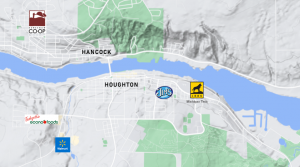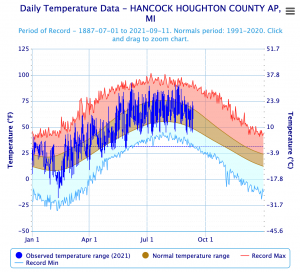Adapting to the diet, weather, and culture of a new place can be challenging as a graduate student, especially if the place has 8 months of snowy winter, 0.3% of Michigan’s population, and only a Walmart. While we understand it is a journey everyone takes, we share below a few points to help you in this process.
Dietary changes are one of the biggest adjustments that international students may need to make when studying in the United States. A healthy diet and adequate sleep are very important to maintain focus on work. Food options in the Keweenaw tend to be much more limited than in other parts of the US or in other countries due to its remote location. The typical American diet can be higher in fats and sugars, which can lead to health problems like weight gain, high glucose levels, high cholesterol levels, and physiological issues. Hence, try to frequently include fresh fruits, vegetables, and nuts in your diet.
Houghton is in a remote area, which limits accessibility to big-city resources. If you are using any traditional medicine, dermatological products, or highly specialized cooking ingredients please check what resources are available here before arriving. It is a good idea to bring things you may need from your home country if you can, including spices.
Some local grocery stores:
- Walmart is often the cheapest option and generally has good produce. It is also accessible via the campus shuttle.
- Econofoods is a good place to do all-around shopping that balances quality and price.
- Jim’s Foodmart has a lot of options for international cuisine.
- The Keweenaw Coop offers a lot of sustainably sourced products and ingredients for those with restrictive diets.
When you visit a US restaurant, please feel free to ask your server about the menu as well as the ingredients. If you have any dietary restrictions, particularly any allergies, be sure to mention them to your server when ordering. Eggs are considered a vegetarian option in the US, so even if you ask for a vegetarian meal, it may include eggs. It is not considered rude to order your food “without eggs” if they can be removed from the dish. Also, when a menu says “cheeseburger”, this means a beef patty with cheese on top. If you do not eat meat, ask your server beforehand about other options.
It is important to know that tipping at US restaurants is expected. Tips less than 15% of the total bill (after tax) are considered rude, and 18-20% is typical for average service. Servers do not get paid minimum wage, and tips make up almost all of a server’s income.
Michigan Tech is above the 45th parallel, so there is limited sunlight during the winter months. Vitamin D deficiencies are common among international students, especially those from tropical countries. Symptoms of this include fatigue, weight gain, constant sickness, and sleeping disorders. These symptoms are especially noticeable during your first winter. If you experience any of these symptoms, please consult a doctor.

Winter in the Houghton area can be quite delightful as long as you’re prepared. Graduate students from warmer climates likely need to extensively prepare for their first winter in the UP. The most important purchase is a warm winter coat. While stylish coats exist, it is vital to be sure your coat will keep you warm in very cold weather. Depending on your tolerance of the cold, you may want to start wearing a winter coat as early as November, so be sure to purchase early.
Other ‘must-have’ outer clothes are a warm hat that covers your ears, thick winter gloves, a warm scarf, and a good pair of snow boots. On particularly cold days, some students wear two pairs of gloves or place hand warmers inside their gloves. It is common practice to dress in layers during the winter. Students should strongly consider purchasing a ‘base layer’ of full-length underclothes to wear underneath normal clothes. Additionally, be sure to purchase thick winter socks, particularly those made of wool. If you will be walking to campus, ice cleats are an optional purchase to help you walk on slippery walkways (but must be removed inside buildings).
